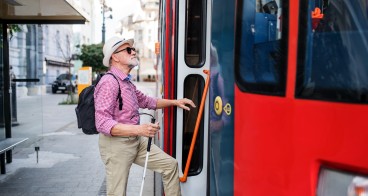Peru: Mobile Cities - Supporting the implementation of the national urban transport policy.
Background
Background
In Peru, the transport system accounts for almost 40 per cent of energy-related greenhouse gas emissions. The Peruvian Government has therefore committed itself to taking specific mitigation measures for this area. There is particular potential for mitigation in public transport, as public transport makes up around 70 per cent of all transport services in many cities. However, there are considerable deficiencies in local public transport in Peru"s cities, making it difficult to modernise the public transport system as desired. There is currently hardly any coordination between urban, transport and mobility planning, and up to 90 per cent of the private transport service providers in cities are unregistered small businesses. An antiquated vehicle fleet and inefficient organisation on the part of the cities further exacerbate the situation. These problems particularly affect women and disadvantaged social groups.
Objectives
The contract is part of the project "Mobile Cities Peru - Supporting the Implementation of the National Urban Transport Policy (CIMO)", which is commissioned by the German Federal Ministry for Economic Cooperation and Development (BMZ) and co-funded by the Swiss State Secretariat for Economic Affairs (SECO). The project CIMO is being implemented by the Deutsche Gesellschaft für Internationale Zusammenarbeit (GIZ) GmbH from April 2022 until March 2026. The project has a financial volume of up to 7,7 million EUR.
The overall objective of CIMO is to support the implementation of the national urban transport policy in Peru. To reach this goal, CIMO intervenes in four outputs:
- Strengthening the National Programme for Sustainable Urban Transport (Promovilidad).
- Developing effective examples of gender-sensitive, integrated public transport systems and measures in cities.
- Advocating for broader use of digital technologies
- Implementing strategies for formalising and professionalising private transport companies.
Its lead executing agency is the Ministry of Transport and Communications (Ministerio de Transportes y Comunicaciones, Perú - MTC) and its subordinated National Programme for Sustainable Urban Transport (Promovilidad). Arequipa, Trujillo and Piura are the projects cities of intervention.
Work packages
GIZ is seeking the services of a contractor (consultancy firm or consortium) with relevant experience in urban mobility and public transport to support CIMO counterparts (primarily MTC, Promovilidad, Arequipa, Trujillo and Piura) to design and implement output 3 and 4.
Work package 1: Output 3 - Digital technologies in urban mobility management
Work package 1 includes advice to the cities of intervention and to PROMOVILIDAD on the structuring of the initial digitalization initiatives in the mobility and transport sector. The aim is to promote modular and compatible systems and on a sustainable basis to guarantee specialized IT services for cities in the mobility and transport sector. It also includes technical assistance to cities on the development and exemplary use of digital tools in urban mobility management, e.g. to strengthen integrated city planning, mobility and transport, to improve access to data and information for users of transport systems, electronic payment systems, the efficient management of means of transport and control systems, and the promotion of registered companies. Furthermore, a concept shall be designed that guarantees long-term IT support for cities to build and maintain digital applications in the mobility and transport sector (for example, through the centralized provision of specialized IT services). Additionally, a digital platform for the management of information and knowledge as a central element of integrated Intelligent Transport Systems (ITS) as a model to be used in cities shall be implemented.
Work package 2: Output 4 - Implementing strategies for formalising and professionalising private transport companies
As part of work package 2, cities will be advised on the development and application of concepts for further formalisation and professionalisation of providers of urban transport services (including appropriate incentive systems). Dialogue between municipal transport departments and private companies to develop and implement sustainable business models for transport service providers (including advice on adapted service contracts) will be fostered. Advising, coaching and continuous training for transport service providers to adapt their companies in terms of corporate structure, business management, accounting, human resource development, financing and solvency models, etc. will be provided. The work package also comprises advice on the adaptation of the regulatory framework at national and city level in order to create additional incentives for the formalization and professionalization of transport companies in the cities.
Note: Language(s) that may be used in the tender or request to participate: English
Published on 17 October 2022.






